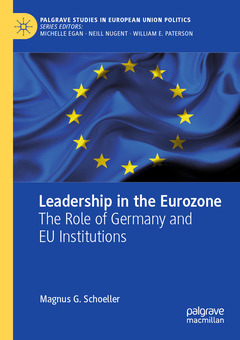Description
Leadership in the Eurozone, 1st ed. 2019
The Role of Germany and EU Institutions
Palgrave Studies in European Union Politics Series
Author: Schoeller Magnus G.
Language: English
Subject for Leadership in the Eurozone:
Keywords
regional integration; supranational institutions; collective actors; political leadership; leadership vs power; types of leadership; leadership model; rational-choice institutionalism; leadership theorizing; leadership surplus; Economic and Monetary Union; Germany; super-commissioner; eurozone; crisis management; Eurobonds; European Central Bank; European Parliament; EU politics; institutional leadership; european union politics
Publication date: 10-2020
223 p. · 14.8x21 cm · Paperback
Approximative price 84.39 €
In Print (Delivery period: 15 days).
Add to cartPublication date: 03-2019
223 p. · 14.8x21 cm · Hardback
Description
/li>Contents
/li>Biography
/li>Comment
/li>




